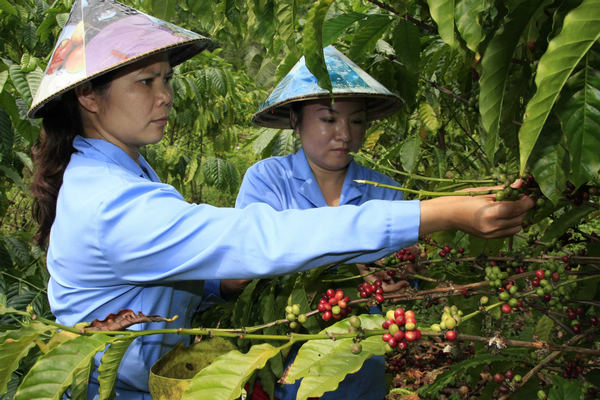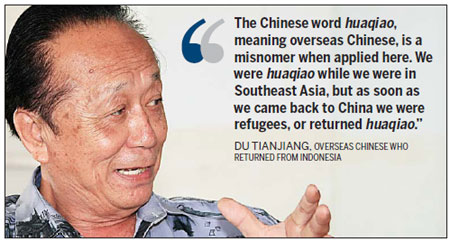Legacy
Rubber trees have been a staple enterprise for Xinglong. "The seeds brought back by huaqiao were of superior quality, and together with their technical know-how, the first generation was able to plant high-grade rubber trees and harvest top-quality latex," Chen said.
A rubber tree can yield an average of 240 yuan per year, and Xinglong turns the sap over to a local processor that manages the next link in the manufacturing chain.
 |
|
Xinglong coffee was once described as "world-class" by former premier Zhou Enlai. [Photo by Huang Yiming / China Daily] |
Aside from a rubber plantation, the farm thrives on its Chinese fruits, such as lychee and longan. Xinglong coffee also has such a good name there is simply not enough to supply the local market, Du said. "Our old president used to say, 'Xinglong is a good place and we should build it into another Hong Kong'."
If he was referring to tourism, it's already taking shape.
Unlike popular destinations such as Haikou and Sanya, the central part of Hainan Island, including Xinglong, is still relatively underdeveloped, although the travel industry accounts for an increasingly large share of the local economy.
"We're reserving west of the Sun River for agriculture, but east of the river is seeing the sprouting of tourism," Chen said. Part of the reason is the east area used to be hit the hardest by typhoons and other natural disasters. "Bananas planted there were destroyed most years," he added.
The east has hot springs, too. As a matter of fact, Chen doubles as the general manager of Xinglong Hot Spring Hotel, one of dozens of such facilities that offer a total of 6,000 beds and receive an annual 1.2 million visitors.
Integration
Despite suspicion by some veteran staff, the integration into the local administration has been a boon for the farm. Not only are projects of infrastructure more readily funded but squabbles with native residents over land use have been dramatically reduced.
As integration with the local economy goes forward, the line between huaqiao and native farmers is becoming blurred. The first generation has largely retired, and their children have more freedom to choose jobs and locations. Today, there are some 6,000 huaqiao in Xinglong, and their ratio in the population has dropped from a high of 80 to 90 percent to 35 to 40 percent.
|
 |
"Do you still call it a huaqiao farm if it's not predominantly staffed by huaqiao?" asked Lei Yuanyan, who returned to China in 1958 at the age of 12. He said he believes that more huaqiao should be in management positions on the farm, as well as in farm-owned or farm-operated businesses.
"Huaqiao are an asset to China," Du said. After being back in the country for half a century, he and other first-generation returnees from Indonesia can still speak fluent Indonesian, a language that very few Chinese have bothered to learn but is useful when it comes to trade. Even an army language school once sent its students to Xinglong to practice their Bahasa Indonesia.
Old huaqiao have infused the local scene with a flavor of Southeast Asia; their habits of drinking coffee and eating exotic foods or cuisine have enlivened Xinglong. They also organize parties that feature singing and dancing styles from the countries where they grew up, and their contact with relatives and friends in those faraway places has been exemplary grassroots diplomacy and effective in spreading goodwill.
However, their fear of a diminishing identity is not unfounded. They are being marginalized. The ground for their uniqueness no longer exists.
Take daily language, for example. In the 1950s and 60s, the dialects most spoken in Xinglong were Hakka and Cantonese. People on the farm rarely interacted with those outside. Now, everyone speaks Mandarin and few reveal their backgrounds by how they speak. You can hardly tell who is a farmhand on the official huaqiao farm and who is a native or a migrant from another part of China.
"We have always cherished the label of huaqiao," Du said. "It's hard for early settlers to plant trees, but easier for late-comers to enjoy the shade."
Lei concurs: "We have enormous pride in our status as huaqiao. The central government has always treated us with preferential policies. But Xinglong no longer belongs to huaqiao alone. It's the homeland of huaqiao, natives and demobilized soldiers.
"We just want our children to remember that Xinglong is the result of their parents' hard work."
